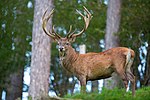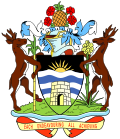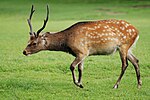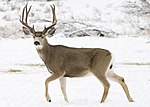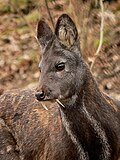The European fallow deer (Dama dama), also known as the common fallow deer or simply fallow deer, is a species of deer native to Eurasia. It is historically...
54 KB (6,574 words) - 23:24, 6 October 2024
Fallow deer is the common name for species of deer in the genus Dama of subfamily Cervinae. The name fallow is derived from the deer's pale brown colour...
11 KB (861 words) - 15:12, 8 September 2024
The Persian fallow deer (Dama mesopotamica) is a deer species once native to all of the Middle East, but currently only living in Iran and Israel. It...
26 KB (3,298 words) - 10:12, 25 October 2024
species of deer are living wild in Great Britain: Scottish red deer, roe deer, fallow deer, sika deer, Reeves's muntjac, and Chinese water deer. Of those...
4 KB (343 words) - 02:20, 26 July 2024
The roe deer (Capreolus capreolus), also known as the roe, western roe deer, or European roe, is a species of deer. The male of the species is sometimes...
47 KB (5,374 words) - 12:31, 26 September 2024
The red deer (Cervus elaphus) is one of the largest deer species. A male red deer is called a stag or hart, and a female is called a doe or hind. The...
48 KB (5,276 words) - 05:05, 25 October 2024
red deer, and fallow deer) and Capreolinae (which includes, among others reindeer (caribou), white-tailed deer, roe deer, and moose). Male deer of almost...
95 KB (10,318 words) - 02:49, 26 October 2024
The Père David's deer (Elaphurus davidianus), also known as the milu (Chinese: 麋鹿; pinyin: mílù) or elaphure, is a species of deer native to the subtropical...
32 KB (4,008 words) - 23:05, 9 October 2024
active only on the island of Barbuda. The party's symbol is the European fallow deer, national animal of Barbuda. The party seeks the secession of Barbuda...
13 KB (645 words) - 11:33, 30 August 2024
Muntjac (redirect from Muntjac deer)
Muntjacs (/mʌntdʒæk/ MUNT-jak), also known as the barking deer or rib-faced deer, are small deer of the genus Muntiacus native to South Asia and Southeast...
11 KB (1,048 words) - 12:22, 26 September 2024
(land) European fallow deer: the main species introduced into these deer parks, smaller and more containable than the large native British red deer Game...
27 KB (3,219 words) - 20:04, 25 October 2024
The water deer (Hydropotes inermis) is a small deer species native to Korea and China. Its prominent tusks, similar to those of musk deer, have led to...
27 KB (3,151 words) - 11:41, 26 October 2024
Eld's deer (Rucervus eldii or Panolia eldii), also known as the thamin or brow-antlered deer, is an Endangered species of deer endemic to South and Southeast...
27 KB (3,355 words) - 16:58, 20 September 2024
The sika deer (Cervus nippon), also known as the Northern spotted deer or the Japanese deer, is a species of deer native to much of East Asia and introduced...
29 KB (3,307 words) - 10:29, 17 October 2024
Chital (redirect from Chital Deer)
may be confused with the fallow deer. Chital have several white spots, whereas fallow deer usually have white splotches. Fallow also have palmate antlers...
39 KB (4,434 words) - 21:04, 27 October 2024
Chevrotain (redirect from Mouse Deer)
Chevrotains, or mouse-deer, are diminutive, even-toed ungulates that make up the family Tragulidae, and are the only living members of the infraorder Tragulina...
24 KB (2,304 words) - 11:13, 16 October 2024
The Philippine mouse-deer (Tragulus nigricans), also known as the Balabac chevrotain or pilandok (in Filipino), is a small, nocturnal ruminant, which is...
9 KB (1,205 words) - 16:25, 1 March 2024
and supply drinking water for other animals including the European fallow deer. Fallow deer were introduced for sport in the early 20th century, and may...
8 KB (746 words) - 00:35, 14 July 2022
The marsh deer (Blastocerus dichotomus) is a species of deer native to South America. It is the largest living species of South American deer. This is...
10 KB (1,177 words) - 11:05, 28 August 2024
Barasingha (redirect from Swamp Deer)
(Rucervus duvaucelii), sometimes barasinghe, also known as the swamp deer, is a deer species distributed in the Indian subcontinent. Populations in northern...
17 KB (1,976 words) - 02:31, 26 May 2024
The tufted deer (Elaphodus cephalophus) is a small species of deer characterized by a prominent tuft of black hair on its forehead and fang-like canines...
8 KB (1,045 words) - 11:22, 3 July 2024
Chinkara (redirect from Chinkara deer)
Elaphodus Tufted deer (E. cephalophus) Dama European fallow deer (D. dama) Persian fallow deer (D. mesopotamica) Axis Chital (A. axis) Calamian deer (A. calamianensis)...
9 KB (958 words) - 22:50, 1 September 2024
Siberian and European roe deer meet at the Caucasus Mountains with the Siberian roe deer occupying the northern flank, and the European roe deer occupying...
14 KB (1,562 words) - 05:13, 18 July 2024
Javan rusa (redirect from Rusa deer)
The Javan rusa or Sunda sambar (Rusa timorensis) is a large deer species native to Indonesia and East Timor. Introduced populations exist in a wide variety...
10 KB (975 words) - 18:41, 27 October 2024
The mule deer (Odocoileus hemionus) is a deer indigenous to western North America; it is named for its ears, which are large like those of the mule. Two...
50 KB (5,062 words) - 07:06, 12 October 2024
this type of deer rather than one/multiple species of musk deer, are entirely Asian in their present distribution, being extinct in Europe where the earliest...
14 KB (1,403 words) - 16:04, 30 September 2024
palmation being narrower than in living European fallow deer (Dama dama). Specimens are known from Western Europe, including Italy and Britain. Evidence...
4 KB (429 words) - 20:30, 25 September 2024
The Siberian musk deer (Moschus moschiferus) is a musk deer found in the mountain forests of Northeast Asia. It is most common in the taiga of southern...
13 KB (1,555 words) - 18:07, 4 April 2024





